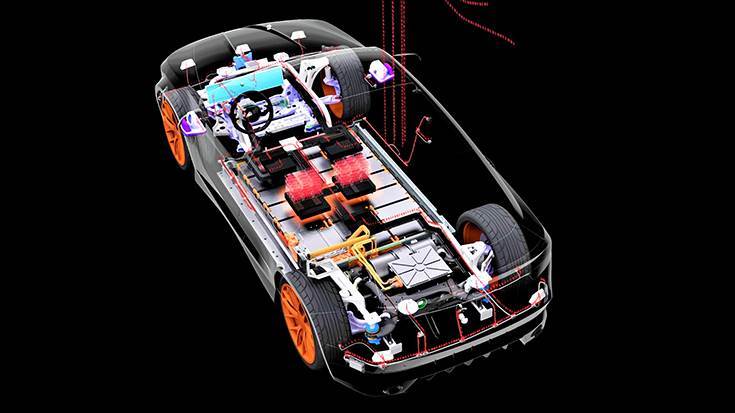Global Tier-1 major Aptiv is betting big on the potential for ADAS (Advanced Driver Assistance Systems) that aim to prevent crashes by deploying active crash-mitigation technologies, from modern-day vehicles in the Indian market. On August 13, the company commissioned its expanded facility in Chennai by making an investment of US$ 45 million or approximately Rs 375 crore, to manufacture these advanced safety solutions as well as SDV products.
In an exclusive interaction with Autocar Professional, Matthew Cole, SVP and President, Advanced Safety and User Experience, Aptiv, said: “There is an increased take rate of ADAS offerings, right from the basic blind-spot detection, all the way to AEB and ACC in the Indian market. We are in discussions with several OEMs and have also secured some contracts, and as a result, have made this investment at our Chennai facility.”
 Developing SDVs requires a purpose-built software and hardware architecture that can adapt to evolving industry demands, for which Aptic has a modular, safety-critical approach.
Developing SDVs requires a purpose-built software and hardware architecture that can adapt to evolving industry demands, for which Aptic has a modular, safety-critical approach.
Cole explained that while Aptiv has been instrumental in enabling the electrification journey for Indian OEMs such as Tata Motors, MG Motor India, and Mahindra & Mahindra over the last few years, the emerging trend now is that towards Software-Defined Vehicles or SDVs and its related systems. “It is this transformation that is leading us to invest US$ 45 million to expand our facility in Chennai for the manufacturing of SDV products. While the initial focus is to produce integrated cockpit computers, the plant is slated to scale to diversify into ADAS offerings, right from Level-0 to Level-2+,” he added.
 Matthew Cole: “We expect nothing but growth from India. Therefore, now is the time to design, develop, and manufacture for India, in India.”
Matthew Cole: “We expect nothing but growth from India. Therefore, now is the time to design, develop, and manufacture for India, in India.”
FOCUS ON DESIGN, DEVELOP & MANUFACTURE IN INDIA
With the new investment, the company is eyeing not just local manufacturing, but is also focusing on local engineering and development of these solutions as well, thus, taking full benefit of the local talent pool in India, where Aptiv presently has 3 technical centres and 7 manufacturing facilities. Its latest technical centre commissioned in Bengaluru in February 2023, is carrying out software development, systems engineering, as well as integrating AI and ML technologies, for Aptiv’s advanced safety and user experience offerings. The R&D centre presently has over 2300 engineers, and with growing demand for futuristic solutions, the company is committed towards continued investment in India.
“The automotive industry is undergoing a significant transformation and now is the time to invest in India. As the Indian economy continues to develop further, we expect nothing but growth from India. Therefore, now is the time to design, develop, and manufacture for India, in India,” Cole said, while also stating that Aptiv’s latest investment will also allow it to explore export opportunities from India to the ASEAN region.
“The US$ 45 million investment is our largest investment in manufacturing in 2023 and 2024, and it is a deliberate move. We are very bullish on India, and we believe in this market, and the region. We have designed this investment to be scalable to see increased investment, particularly in manufacturing equipment and capital so that we continue to grow in Chennai, in the future,” he added.
 With Aptiv’s Gen 6 ADAS platform, the configurations are grouped into four categories, though each can be modified to meet the needs of specific OEMs:
With Aptiv’s Gen 6 ADAS platform, the configurations are grouped into four categories, though each can be modified to meet the needs of specific OEMs:
ADAPTING THE LATEST TECH FOR INDIA
While Aptiv offers a range of advanced active safety systems globally, Cole acknowledged that traffic and road conditions in India require localised solutions. “When it comes to the ADAS features and functionalities, largely what is used globally is used in India as well. However, it does require local adaptation. There is a lot of training and certain integration that is required unique for the Indian market.”
“Having said that, we have designed our safety solutions to be scalable and adaptable for regional requirements. For instance, Indian roads tend to be more congested and have lesser lane markings with different road objects, thus calling for unique training and object classification. Therefore, we have adapted our development process to ensure we can meet these unique needs of the Indian market,” Cole explained.
Although Aptiv’s focus so far has been on the passenger- and commercial vehicle segments when it comes to offering vehicle safety systems in India, the company says it will explore the two-wheeler segment as well. “We address the entire mobility market, and while our focus has been more on four wheelers (passenger- and commercial vehicles), as we see more opportunities in adjacent categories like two-wheelers, we will evaluate them,” Cole signed off.
<>
